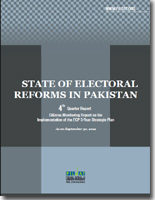This 4 Quarterly Report prepared by PILDAT since October 2011 to monitor the progress of implementation on the ECP 5-Year Strategic Plan. Pakistan is a country with the lowest voter turn-out among the countries of South Asia and sixth from the bottom among 169 countries whose average voter turn-out statistics were compiled by IIDEA, an international inter-government organization based in Sweden. According to the statistics complied, the average voter turn-out for the last eight general elections (excluding 1977 election which was largely believed to be rigged) works out to be 46.12 %. One of the possible explanations for this low voter turn-out has been the voters’ lack of trust in the electoral system. This weak credibility of the electoral system in general and the Election Commission of Pakistan in particular has been at the heart of the weak political system in the country. After the 9 General Election in Pakistan held in 2008, important strides have been made on electoral reforms in Pakistan. The Election Commission of Pakistan’s 5 Year Strategic Plan outlines some of the reform initiatives that are planned by the ECP. While the ECP has the responsibility to implement the 5-year strategic plan, it is the responsibility of the citizens to monitor the progress of implementation and raise questions where the progress is slow or stalled. This is the 4 Quarterly Report prepared by PILDAT since October 2011. PILDAT firmly believes that citizens’ monitoring report is not an effort in finger-pointing and instead it is helpful to the ECP in overcoming obstacles in the way of timely implementation. The Monitoring Report is an initiative to further strengthen the transparency in the ECP operations which have tremendously improved over the past couple of years.
State of Electoral Reforms in Pakistan
4th Quarter: Citizen's Monitoring Report on the Implementation of the ECP 5-Year Strategic Plan: As on September 30, 2012







